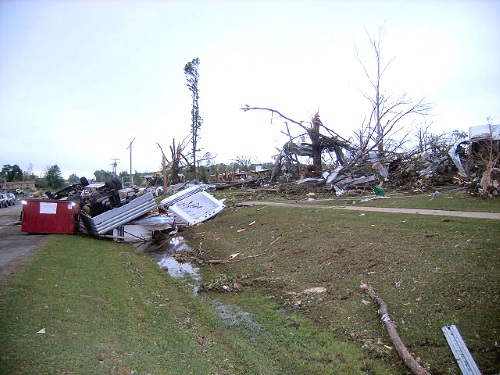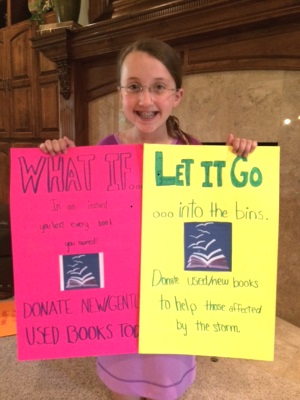Local Librarians Help Those Affected by Arkansas Tornado
On April 27, a tornado devastated hundreds of homes and took fifteen lives in the suburbs of Little Rock, Arkansas. The Central Arkansas Library system is donating their overdue book fines to tornado relief efforts and a book drive is being held for students most badly affected by the storm.

Damage following the deadly tornado in Mayflower, Arkansas on April 27, 2014. National Weather Service photo (Wikimedia Commons).
On April 27, a tornado devastated hundreds of homes and took fifteen lives in the suburbs of Little Rock, Arkansas. In the rural areas north of Little Rock, the towns of Mayflower and Vilonia (in Faulkner County) suffered the most severe damage, with several families losing their homes. In the days after the tornado, the Central Arkansas Library System (CALS) decided to donate their overdue book fines during the week of May 5-12 to the Arkansas Community Foundation's Emergency and Disaster Relief Fund, the local non-profit overseeing relief operations. (For a list of how you can aid in relief, visit here.) Susan Hill Gele, assistant director of Public Relations at CALS, notes that the innovative donation idea has been used before during disasters with similar “widespread damage” like with Hurricane Katrina, previous tornados in the area, and when one of their library branches was damaged in a fire in 2011. All 14 library branches in the system are participating in the book fines program and the money will be used at the discretion of the Disaster Relief Fund. Readers can pay their fines at circulation desks and online. Gele explains that “in addition to the fines, people make donations,” which have added up to approximately $5,000 per week they have run the overdue fine donation drive in the past, and she hopes to do as well this time. Dr. Stephanie Vanderslice, a creative writing professor at Central Arkansas University and Conway, Arkansas resident, also saw the need to help those in her community as well. As she dealt with the aftermath of the tornado during which “houses literally blew away,” she thought about those families with young children, especially those who love to read like her children do. Food and shelter are obvious immediate needs, but Vanderslice thought about how families losing homes also means “losing all their books… Where do [people] turn to for comfort [without those books]?”
Even students are getting involved in tornado relief book drives, as 12 year old Zoe Russell of Carl Stuart Middle School in Conway, AK demonstrates with her posters. Photo courtesy of Stephanie Vanderslice and taken by Zoe Russell.
Vanderslice began with a Facebook post a few days ago mirroring that sentiment. Within a few hours, friends and contacts at CALS and the Faulkner County Public Library came together, and the decision to collect donated books “just took off from there,” according to Vanderslice. The members of the informal Facebook committee were able to determine that approximately 150 Mayflower and Vilonia students lost everything in the tornado, and they have come up with a plan to provide 10 books per child. Gele says that CALS has donated approximately fourteen cases of children’s and young adult books and should there still be a need, CALS will donate “as much as the volunteers can fit in their car” in order to meet the estimated need of 1,500 books. Vanderslice notes that the Faulkner County Public Library and her office have been the main drop-off locations—with donations accepted until May 20. At the end of the month, Vanderslice and the committee will host a free bookstore for the kids affected at the schools. Vanderslice says that no operating school buildings were badly affected so students are still able to attend school. For the students to carry their wares, the Arkansas Reading Association has donated cloth tote bags. Sarah Coker, friend of Vanderslice and the literacy specialist at Ruth Doyle Middle School in Conway, Arkansas, was quick to act on the book donation initiative started on Facebook as well. She has set up an account with Scholastic to facilitate new book donations for those unable to donate their own books or those wishing to help outside of the direct community (Go to “Find Your Teacher” link. Enter activation code: N6VLZ. Teacher: Ms. Storm Book Drive). The areas surrounding Little Rock have been declared “major disaster areas” as a result of the tornado damage. Communities will have a long road to recovery, with the basic needs of food, shelter, and aid being handled by nonprofits and government. Those young students who have lost their homes can have hope though, that their reading needs will not fall to the wayside.Mythili Sampathkumar is a UN reporter and freelance journalist based in NYC and loves visiting old libraries and used book stores in every city she travels. Follow her on Twitter @RestlessRani.
RECOMMENDED
CAREERS
The job outlook in 2030: Librarians will be in demand
CAREERS
The job outlook in 2030: Librarians will be in demand
ALREADY A SUBSCRIBER? LOG IN
We are currently offering this content for free. Sign up now to activate your personal profile, where you can save articles for future viewing






Add Comment :-
Be the first reader to comment.
Comment Policy:
Comment should not be empty !!!